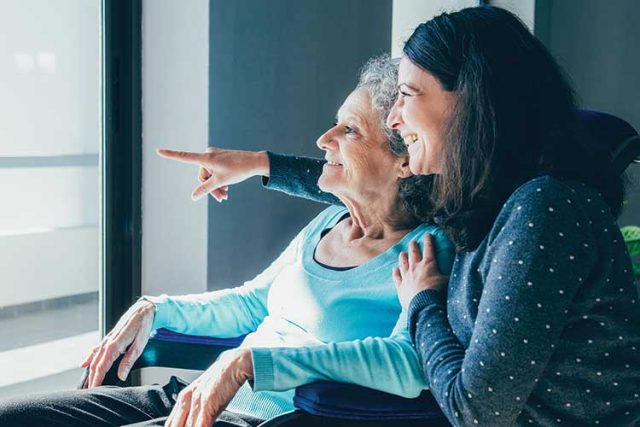Those of us who are caring for kids at home while also looking after parents or loved ones with increasing needs are often referred to as the “sandwich generation.” According to a recent study, nearly 50 percent of adults ages 40–59 have a minor at home and a parent who will require increasing care levels. The good news is if you find yourself in this situation, you are not alone — although it can be exhausting and daunting trying to manage the emotional, medical, and financial logistics — there are ways to make it easier.
FIND SUPPORT
Even if we wanted to drop everything to care for an older parent, it is likely impossible we can. Don’t feel guilty about asking for help — family members far away can help either financially or with remote tasks. You can also enlist the help of neighbors and friends who can spend time with your parents, do errands, and help with appointments. Hiring outside help can be expensive, but if it is possible, it is worth the investment. We have found amazing caregivers through an agency called Senior Helpers, which has allowed us to still be a part of our parents’ care and daily lives but provided some flexibility for us throughout the day.
HAVE THE HARD CONVERSATIONS
We know we should have these conversations early on, but they are always the easiest to put off. It is difficult, but if you can carve out time to talk about what is important to your parents, and what they want, it takes the pressure off trying to guess when you no longer can have those conversations. It is important for older people to keep their independence, and for many, to keep their familiar surroundings.
We recently were designing an addition to our home with the anticipation that at some point our parents might need to come live with us. This was our plan, but in talking to them, this is not their plan. They would like to stay in their home, if possible, even if that means bringing people in to help with the care.
Illness, disease, or accidents can change life in a moment, so having those conversations while parents are healthy is important. It is also important to understand their financial situation and if you or siblings will need to help.
A FAMILY AFFAIR AND SELF CARE
Depending on the age of your children, they will be aware of changes they see with their grandparents or other relatives. Children will likely sense the stress you feel being worried about their illnesses, how to take care of them, and not knowing what the future holds. However, some of life’s greatest lessons can lie within all that stress: teaching our children, no matter their age, ability, or maturity to care for others and to have empathy for older relatives. Children want to help, and as I always tell my children, your grandparents spent a lot of years looking after you and taking care of your needs, and now it is your turn to return the favor and help take care of them. This could mean getting them a snack, playing a game with them, or learning how to fill a hot water bottle.
It is also important to talk to your children and answer their questions in an age-appropriate way about the changes they are seeing in their older relatives. This helps take the fear and anxiousness out of the aging process and helps them understand and feel a part of what is happening. Giving them a role also helps them to understand how your time needs to be spent. They are less likely to be angry or resentful when you must choose the needs of an older relative over theirs.
Raising two teenagers and a younger son while balancing health issues of parents and older relatives is enough to keep anyone awake with worry and stress at night. If there is anything I have learned, it is the importance of self-care — we can’t take care of others if we don’t take care of ourselves. It may be a daily walk, a yoga class, or a nightly meditation, which can be hard especially for us moms who tend to put everyone else’s needs ahead of our own. There will be days when you will have to give more to your parents and some days your kids will require more, but be gentle with yourself and remember you are only human and doing the best you can. Caregiving, whether it is for our children, parents, or older relatives is a gift, so relish the joy of the small moments.
Liz Farrell is the mother of three children and the founder of TechTalks, a consulting group to help schools and families have productive conversations around social media and technology. Email: [email protected]





